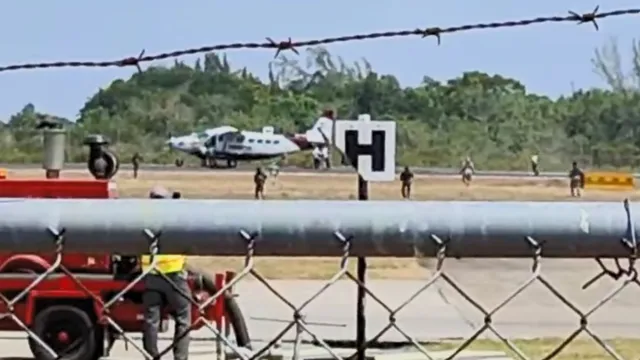
U.S. man hijacks plane in Belize, passenger shoots him dead
2025-04-18 03:49- Akinyela Sawa Taylor hijacked a Tropic Air airplane, injuring three individuals onboard.
- The hijacking lasted over two hours while the plane circled due to fuel constraints.
- The intervention by a licensed passenger who shot Taylor prevented further casualties.
Express your sentiment!
Insights
On April 17, 2025, an incident occurred at the Philip S.W. Goldson International Airport in Belize, where Akinyela Sawa Taylor, a U.S. citizen, hijacked a small plane. The Tropic Air Belize flight was preparing to take off with 14 passengers onboard, including tourists. Taylor reportedly demanded to be taken out of the country and requested more fuel for the aircraft, brandishing a knife and injuring three individuals, including the pilot. As the situation escalated, the aircraft circled the area for approximately two hours due to fuel concerns. Eventually, one of the wounded passengers, armed with a licensed firearm, shot Taylor in the chest, resulting in his death. After the emergency declaration was made, the aircraft successfully landed at the airport, where authorities were ready to respond. The police were later informed about the hijacking via text updates from a passenger still on board during the crisis. Belizean officials praised the actions of the passenger who intervened and shot the hijacker, referring to him as a hero. The U.S. State Department and the Belizean authorities began collaborating on the investigation to understand the motives behind Taylor's actions and how he had managed to bring a knife onto the plane. Authorities confirmed that the suspect had been previously denied entry into the country and were also probing the entry points of security failures surrounding this incident.
Contexts
In recent years, the safety of air travel has come under increased scrutiny, particularly concerning small aircraft operations. The focus of this report is on the airport security protocols in Belize regarding potential hijacking incidents involving such planes. Given the tourism dependency of Belize, ensuring robust security measures at its airports is crucial for safeguarding passengers and maintaining the integrity of the aviation system. The small plane sector, often less monitored than larger commercial operations, presents unique vulnerabilities that can be exploited by individuals with malicious intent. A thorough examination of current practices offers insight into effectiveness and areas for improvement. The Belize Airport security protocols encompass various layers, including passenger screening, baggage inspection, and aircraft monitoring. However, the effectiveness of these protocols has been challenged by instances of lax enforcement and limited resources dedicated to small aircraft operations. Unlike larger airports that benefit from advanced security technologies and protocols, smaller airports in Belize often operate on tighter budgets, leading to potential gaps in security oversight. Recommendations from security experts suggest an increased focus on staff training, the implementation of advanced screening techniques, and enhanced engagement with local law enforcement agencies to mitigate potential risks. Another critical aspect of airport security in Belize is the coordination between aviation authorities and international security standards. Compliance with guidelines set by international organizations such as the International Civil Aviation Organization (ICAO) is paramount, yet challenges remain due to budget constraints and varying levels of political will. An assessment of the current regulatory framework indicates a need for a more stringent adherence to these standards to prevent hijackings and other security breaches. Training programs for airport personnel, including emergency response drills and threat assessment exercises, are essential in cultivating a culture of security awareness among staff. In conclusion, the threat of small plane hijackings at airports in Belize necessitates a robust and comprehensive approach to ensure passenger safety and enhance the overall security framework. By investing in better training, updating protocols, and aligning with international standards, Belize can significantly improve its defense against such incidents. Collaborative efforts between government authorities, airport management, and international agencies can lead to a more secure aviation environment. Continuous evaluation and adaptation of security measures in response to emerging threats are vital for maintaining public confidence and the safety of air travel within the region.